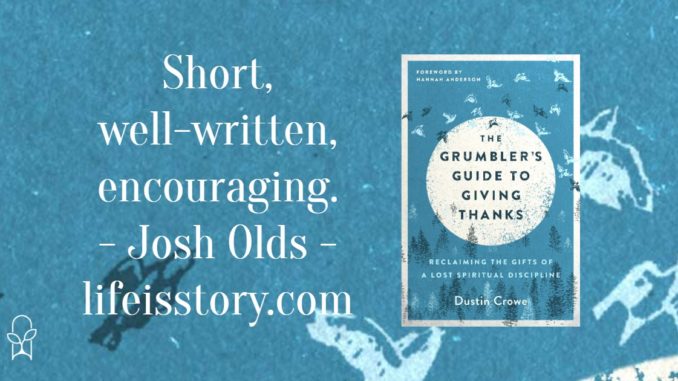
Also by this author: World on Fire: Walking in the Wisdom of Christ When Everyone’s Fighting About Everything
Published by Moody Publishers on October 6, 2020
Genres: Non-Fiction, Christian Life
Buy on Amazon
Goodreads

Trade Grumbling for Gratitude—Experience God like Never Before
The apostle Paul instructed the Philippians to be anxious in nothing and thankful in everything. And when he said everything—he meant everything. We can all agree that this is easier said than done. Disappointments and discontent may cause you to slip into dissatisfaction, and grumbling becomes a state of mind—gratitude seems impossible to find. However, what if this is the precise reason you lack the joy of a God-filled life? Instead of a reaction to when things are going well, what if gratitude is actually necessary to knowing the hope of our gracious God?
This is exactly what Pastor Dustin Crowe identifies in The Grumbler’s Guide to Giving Thanks. Dustin examines the biblical foundations of thankfulness and traces how it can reshape every-day Christian living. When we express gratitude in all things, we not only praise our Creator, we also get to know Him better. With The Grumbler’s Guide, you’ll learn how to practice thanksgiving in both simple and extraordinary ways, even when you’re tempted to dwell on the negative. You’ll find your outlook on life realigned to see the hand of God in everything, strengthening your trust in Him. And in doing so, you’ll find greater, more joy-filled reasons to continue expressing thanks to our good and generous God.
I am a pessimist. I freely admit it. It’s difficult to not be a pessimist (in my opinion) in this day and age. Thanksgiving doesn’t come naturally for me. (Obligatory note that Thanksgiving was instituted only to project unity amid civil war and celebrates a cultural mythology that downplays European genocide of the indigenous peoples…) So, well, you see my problem. The Grumbler’s Guide to Giving Thanks is supposed to be a pathway out, complete from guy-who’s-been-there Dustin Crowe.
The book starts with a biblical foundation of thanksgiving: Identifying reasons to give thanks, recognizing God as giver, expressing thanksgiving to him, and better knowing him through it all. Then, it moves to a theology of thanksgiving by discussing the OT sacrificial system and how God intends for our very lives to be given as a thanks offering.
The middle section of the books moves to practical ways to show thanks. Crowe shows us how to spot reasons to be thankful—both big and small. Remove our busyness. Remove our distraction. Find what God is giving us even amid seasons of stress and loss. He then encourages us to express our thankfulness: in word, in deed, in song, and in action. Crowe suggests that we not just say thanks, but be thankful. Thankfulness as an internal orientation moves outward and affects everything we are and do.
The last part of the book focuses on seasons of struggle. Living a thankful lifestyle does not mean we have to downplay or ignore traumas and tragedies. He writes about the number of times that the OT Israelites were told to remember their past so that they would be thankful about their present. Their national holidays were a symbolic reliving of a traumatic past to thank God for his deliverance. Crowe closes with an exhortation for us to be thankful in all things, even our trials.
The Grumbler’s Guide to Giving Thanks is short, well-written, and encouraging. I wonder, though, if it is rooted too much in a theology of celebration and doesn’t acknowledge enough that lament and thanksgiving can go hand-in-hand. While the book acknowledges that trials and traumas will come, it only offers an answer of “trust God anyway,” which is a theologically correct answer that is often of little comfort.
With a more robust discussion of how lament and thankfulness work together—and not against—one another, Crowe could have really elevated the book’s substance. As is, the content remains mostly superficial. It’s a quick hit of caffeine, a veneer that covers brokenness, but never digs down deep enough to have a serious, substantive discussion of finding joy amid sorrow. Maybe that wasn’t the book’s purpose, but as a self-proclaimed pessimist—someone who believes the world can be a better place and that the enemy of great is good—I needed to see how we could marry thankfulness with lament, and that’s not something Crowe adequately addresses.
